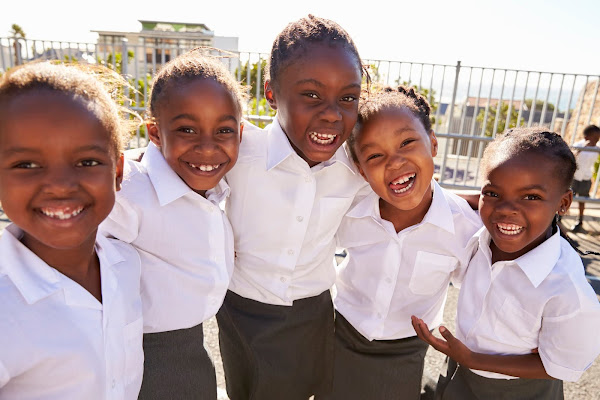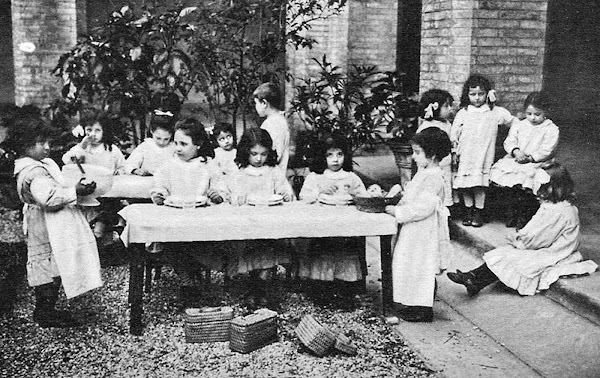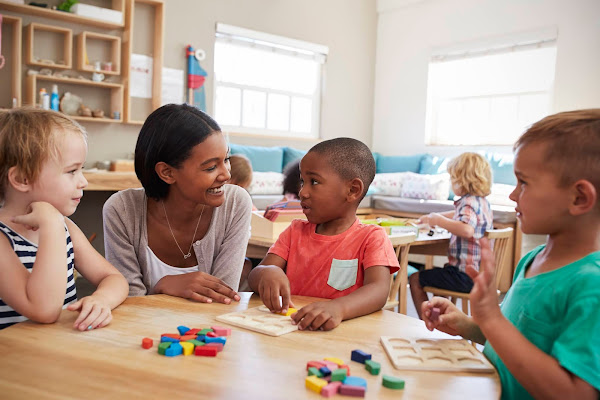Montessori and the UNESCO Futures of Education Initiative

Education and Peace
Dr. Montessori had no intention of creating a system of education when she opened the first Casa dei Bambini in San Lorenzo, Rome. In fact, she was not hired as a teacher in San Lorenzo but as the medical officer, overseeing the hygiene, food, and sanitation in the housing development of about 10,000 people. (Montessori) While the project revitalized the living conditions of families, there was no provision for the children. Fifty children were relegated to one room to keep them out of the way, and Montessori tells us it resembled a prison.
Dr. Montessori provided the children with didactic materials she had used previously when studying experimental psychology; materials that would later become the foundation of her practical life and sensorial materials. She was surprised when the children not only used the materials but learned from them as well. “And the strangest thing of all was that although nobody had cared for them physically, they flourished in health as if they had been secretly fed on some nourishing food. And so they had, but in their spirit.” (Montessori) The children’s transformation had a ripple effect, bringing about positive change in their community as well.

Perhaps the most astonishing aspect of Montessori’s experiment was that no one forced the children to learn. There were no mandatory collective group lessons. There were no textbooks or memorization exercises. The children learned because they were excited to do so. This new knowledge called to the children and satisfied an inner curiosity and drive that had never been seen before. Calling this “the secret of life” (Montessori), Montessori denounced that she had anything to do with it. “It is not possible that it came because of my method, for at the time my method did not yet exist.” (Montessori)
- Standardized curriculum and testing
- Standardized collective lessons
- Grades and rank as a form of incentivizing learning
- Constant drill and repetition to force memorization
- Children as tabula rasa (blank slates)
- Education as adult (teacher) centered
- Passive learning with everyone sitting in neat rows
- Single-age classrooms
- External validation
- Child as dependent and helpless
- Children needing to be enticed and entertained in order to learn
- Learning and growth as a linear progression
- Knowledge must come from a higher authority
Of course, a change in global education shouldn’t be based on the findings of just one person. Educational theory and methods should be based on valid and reliable research and brain development theory. That said, over a hundred years later, current neuroscience concurs with Dr. Montessori’s conclusions:
- Sensory information gathered from the hands is “significantly superior” to information gathered using other parts of the body. (Exploring your Mind)
- Activity and active learning “promote a better mastery of motor, sensory, emotional, and cognitive skills.” (Exploring your Mind)
- Children who attend Montessori preschools have greater executive functioning skills. (Exploring your Mind)
- Neuroscience concurs that there are definite sensitive periods for learning and development. (Exploring your Mind)
- Frontal lobe mirror neurons absorb information through the senses. (Exploring your Mind)
- Praise, rewards, and punishments tend “to reduce the recipient’s interest in the task or commitment to the action.” (Kohn)
- Low-income, at-risk students demonstrate higher levels of academic achievement when learning is centered on their interests and questions and “organized around real-life problems and projects,” when "exploration is both active and interactive,” and when “success is judged by authentic indicators of thinking and motivation.” (Kohn)
- Children who choose their own work problem-solve twice as much and freely choose to do more work than children who have no choice (or perceive they have no choice). (Matte)

How should education be used to shape our future? To find the answers, we need only look as far as the child before us. By making the child the center of educational reform and removing our own egos, we quickly realize that we must educate the child to be the adult of the future. This is a future we cannot envision for it doesn’t exist yet and the world is changing so rapidly, we can’t predict what it will look like. What we do know is that the world will need people who ask questions, are inquisitive, problem-solve, collaborate, are inclusive, are independent, and who are peaceful. And we can only form these adults by cultivating these qualities in the child.
Kohn, Alfie. Criticizing (Common Criticisms of) Praise.February 3, 2012.
Kohn, Alfie. Poor Teaching for Poor Children … in the Name of Reform.April 27, 2011.
Matte, Austin. Montessori: The New Science Behind a Century-Old Methodology (Part I). Learning and the Brain, June 11, 2017.
Montessori, Maria. The First Casa dei Bambini. Montessori Australia.
Michelle Irinyi — NAMC Tutor & Graduate